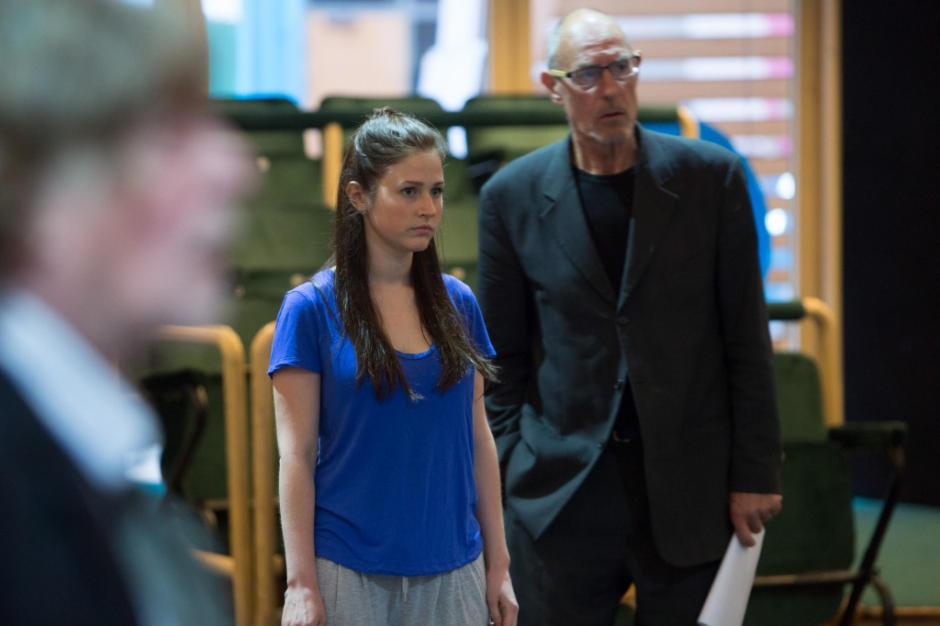With Caroline Steinbeis bringing a new production of ‘The Crucible’ to the Royal Exchange Theatre in the centenary year of Arthur Miller’s birth, The Manchester Review took the chance to talk to Rachel Redford, up and coming actor and RADA 2013 graduate about her role in the play, dealing with a character who is “so hated” and what audiences should expect from the show itself.
It is a break between rehearsals, but over the phone, Rachel Redford sounds anything but tired – something of a surprise considering just how busy the last few weeks must have been – to say nothing of the last few years. From Penarth, Rachel originally wanted to be a dancer but encouraged by her mother, (herself a former actor) became increasingly drawn to pursing drama. “Mum told me to go to RADA, I applied and got in!” What followed was three “deeply challenging years” of maturing, developing and learning “as a person and as a performer.”
Following graduation with roles in Lone Scherfig’s ‘The Riot Club’ and James Kent’s ‘Testament of Youth’ as well as impressive work at the Donmar and Redford is well on the way to building an impressive early career. Her aims seem refreshingly grounded as her two big concerns when I bring this up are to ‘keep enjoying what I’m doing’ and be able work towards a sense of financial security – (what recent graduate wouldn’t agree with that!)
From an artistic point of view, there is something potentially quite risky about a production of “The Crucible.” Arthur Miller’s 1953 play has been a fixture of GCSE, A-Level and undergraduate reading courses so any new production has to find a way of engaging audiences afresh. All too often, the play can be reduced to a series of somewhat static moral gestures, with Abigail the scheming young woman, Proctor the man of integrity and religion the source of all the hysteria and rumour. It’s a risk that Redford seems well attuned to – The Crucible was one of the first plays she read at the age of thirteen and thus there comes not just the professional pressures but a deep ‘personal pressure’ of taking on a character who is ‘so hated.’ Abigail, as a character does so much that is ‘morally corrupt, but she justifies her herself’ and thus, as an actor, the key challenge is to find the justification, find that believability.’ Abigail is ‘so hated’ but Redford makes the intriguing point that for her, Abigail treats The Crucible ‘as an act of love…the only way they [Abigail and John Proctor] can be together.’
There are a few details of the play that tend to be glossed over too – the strict patriarchal nature of the Puritan society means that it is men who dominate the power structures, the law, the clergy and the body politic of the community more generally. In this kind of society Redford points out, women are ‘extremely oppressed’ and cannot wield the same kind of power that men possesses. The female power of the play is ‘enticing and seductive’ so the ‘girls use this as an opportunity to attempt to overthrow things.’
It is in the interpersonal relationships that the play really does come alive, as Redford puts it, ‘underneath the politics, the relationships are very real.’ What strikes me is Redford’s acknowledgement of something that all too often is ignored in favour of the political issues – a deep-seated sexual hypocrisy. John Proctor is twenty years older than Abigail is and takes her virginity whilst denying the reality of what he did. ‘Proctor should have known better’ is Redford’s conclusion. While that does not excuse Abigail, her reaction is a ‘very teenage reaction’ and thus, in a way, infinitely more understandable.
Whereas Abigail and the society depicted in the play fail to grasp the often-violent power of sexuality and desire today, Redford claims ‘we’ve become numb to it.’ The play opens with the girls dancing in the woods – something seen as a harmless anachronism to the modern viewer but is something that the community reacts to with visceral shock. Redford tells me that the cast struggled to think of something that would illicit the same kind of shocked reaction today – what expression of teenage sexuality would jolt us in the same way? ‘Sex in public was the best we could come up with’ Redford says – ‘that was how far we had to go.’
Such instances do occur though, and it is in our modern societal reaction to them that we see something else that still resonates with The Crucible – namely, the reaction to the event. In the age of social media, where scandal can be whipped up in no time at all and all of uscan become global spectators of the humiliation or embarrassment of the individual The Crucible serves as a powerful reminder of the human cost such digital voyeurism can exert. In this play, ‘everyone follows everyone else’s movements’ and there is a combination of voyeurism, fear but also a dangerous kind of pleasure, ‘just look at the Putnam’s! That’s exactly why they get involved!’ Rachel exclaims – the play is about how things can spread from Salem village to the town, and how threatening gossip, speculation and entertainment can become.
Our conversation ends and I ask Rachel (who has another eight hours of rehearsals to get back to) what people should expect when they come to see the see the show. The excitement in her voice swings up a notch, ‘It’s epic, brutal and ugly. This isn’t a nice production, a sanitised production – it’s honest, sexual, loving and angry.’ Ultimately, Rachel finishes by telling me that the show is about ‘a group of people, trying to survive. And failing.’
Jon Greenaway
The crucible will be at the Royal Exchange from 18/09 till 24/10 at the Royal Exchange theatre. For tickets (including £6 tickets for students and those under 26)please go to http://www.royalexchange.co.uk/under-26s-students

